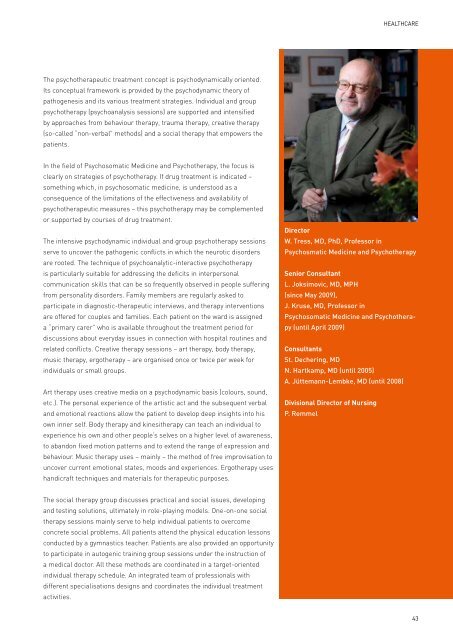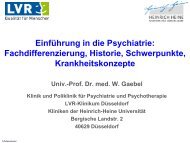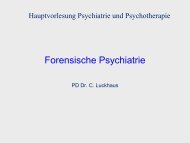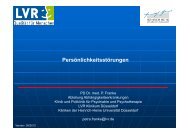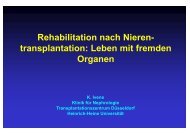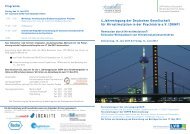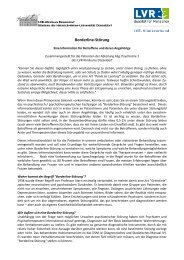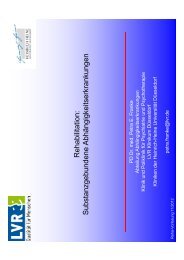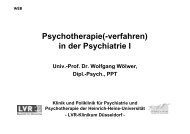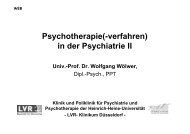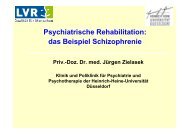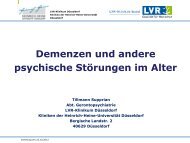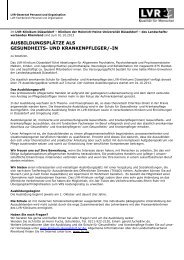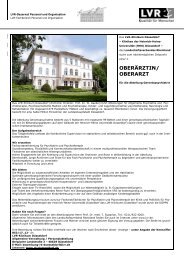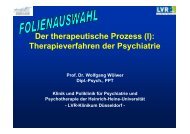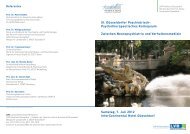LVR-Klinikum Düsseldorf Hospital of the Heinrich-Heine University ...
LVR-Klinikum Düsseldorf Hospital of the Heinrich-Heine University ...
LVR-Klinikum Düsseldorf Hospital of the Heinrich-Heine University ...
Create successful ePaper yourself
Turn your PDF publications into a flip-book with our unique Google optimized e-Paper software.
The psycho<strong>the</strong>rapeutic treatment concept is psychodynamically oriented.<br />
Its conceptual framework is provided by <strong>the</strong> psychodynamic <strong>the</strong>ory <strong>of</strong><br />
pathogenesis and its various treatment strategies. Individual and group<br />
psycho<strong>the</strong>rapy (psychoanalysis sessions) are supported and intensified<br />
by approaches from behaviour <strong>the</strong>rapy, trauma <strong>the</strong>rapy, creative <strong>the</strong>rapy<br />
(so-called “non-verbal” methods) and a social <strong>the</strong>rapy that empowers <strong>the</strong><br />
patients.<br />
In <strong>the</strong> field <strong>of</strong> Psychosomatic Medicine and Psycho<strong>the</strong>rapy, <strong>the</strong> focus is<br />
clearly on strategies <strong>of</strong> psycho<strong>the</strong>rapy. If drug treatment is indicated –<br />
something which, in psychosomatic medicine, is understood as a<br />
consequence <strong>of</strong> <strong>the</strong> limitations <strong>of</strong> <strong>the</strong> effectiveness and availability <strong>of</strong><br />
psycho<strong>the</strong>rapeutic measures – this psycho<strong>the</strong>rapy may be complemented<br />
or supported by courses <strong>of</strong> drug treatment.<br />
The intensive psychodynamic individual and group psycho<strong>the</strong>rapy sessions<br />
serve to uncover <strong>the</strong> pathogenic conflicts in which <strong>the</strong> neurotic disorders<br />
are rooted. The technique <strong>of</strong> psychoanalytic-interactive psycho<strong>the</strong>rapy<br />
is particularly suitable for addressing <strong>the</strong> deficits in interpersonal<br />
communication skills that can be so frequently observed in people suffering<br />
from personality disorders. Family members are regularly asked to<br />
participate in diagnostic-<strong>the</strong>rapeutic interviews, and <strong>the</strong>rapy interventions<br />
are <strong>of</strong>fered for couples and families. Each patient on <strong>the</strong> ward is assigned<br />
a “primary carer” who is available throughout <strong>the</strong> treatment period for<br />
discussions about everyday issues in connection with hospital routines and<br />
related conflicts. Creative <strong>the</strong>rapy sessions – art <strong>the</strong>rapy, body <strong>the</strong>rapy,<br />
music <strong>the</strong>rapy, ergo<strong>the</strong>rapy – are organised once or twice per week for<br />
individuals or small groups.<br />
Art <strong>the</strong>rapy uses creative media on a psychodynamic basis (colours, sound,<br />
etc.). The personal experience <strong>of</strong> <strong>the</strong> artistic act and <strong>the</strong> subsequent verbal<br />
and emotional reactions allow <strong>the</strong> patient to develop deep insights into his<br />
own inner self. Body <strong>the</strong>rapy and kinesi<strong>the</strong>rapy can teach an individual to<br />
experience his own and o<strong>the</strong>r people’s selves on a higher level <strong>of</strong> awareness,<br />
to abandon fixed motion patterns and to extend <strong>the</strong> range <strong>of</strong> expression and<br />
behaviour. Music <strong>the</strong>rapy uses – mainly – <strong>the</strong> method <strong>of</strong> free improvisation to<br />
uncover current emotional states, moods and experiences. Ergo<strong>the</strong>rapy uses<br />
handicraft techniques and materials for <strong>the</strong>rapeutic purposes.<br />
The social <strong>the</strong>rapy group discusses practical and social issues, developing<br />
and testing solutions, ultimately in role-playing models. One-on-one social<br />
<strong>the</strong>rapy sessions mainly serve to help individual patients to overcome<br />
concrete social problems. All patients attend <strong>the</strong> physical education lessons<br />
conducted by a gymnastics teacher. Patients are also provided an opportunity<br />
to participate in autogenic training group sessions under <strong>the</strong> instruction <strong>of</strong><br />
a medical doctor. All <strong>the</strong>se methods are coordinated in a target-oriented<br />
individual <strong>the</strong>rapy schedule. An integrated team <strong>of</strong> pr<strong>of</strong>essionals with<br />
different specialisations designs and coordinates <strong>the</strong> individual treatment<br />
activities.<br />
HealtHcare<br />
Director<br />
W. Tress, MD, PhD, Pr<strong>of</strong>essor in<br />
Psychosmatic Medicine and Psycho<strong>the</strong>rapy<br />
Senior Consultant<br />
L. Joksimovic, MD, MPH<br />
(since May 2009),<br />
J. Kruse, MD, Pr<strong>of</strong>essor in<br />
Psychosomatic Medicine and Psycho<strong>the</strong>rapy<br />
(until April 2009)<br />
Consultants<br />
St. Dechering, MD<br />
N. Hartkamp, MD (until 2005)<br />
A. Jüttemann-Lembke, MD (until 2008)<br />
Divisional Director <strong>of</strong> Nursing<br />
P. Remmel<br />
43


